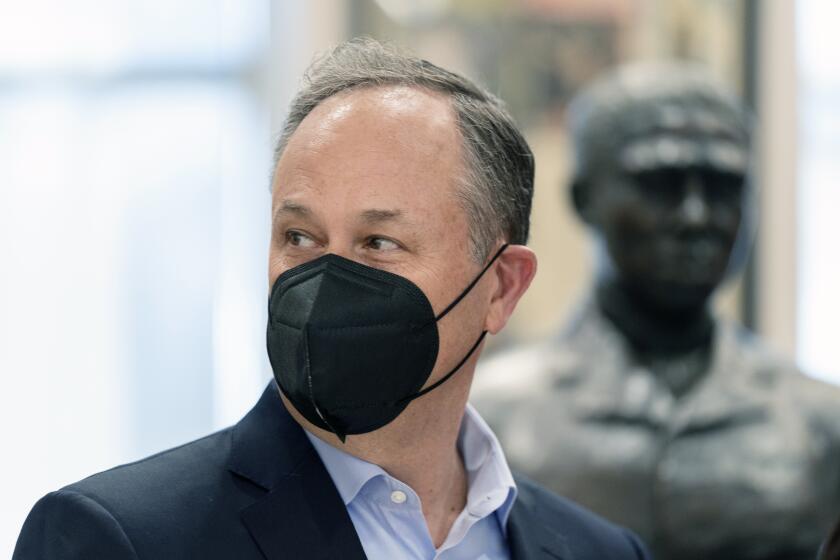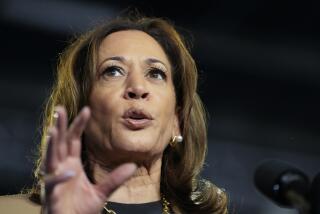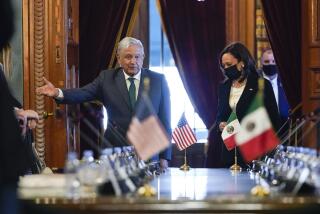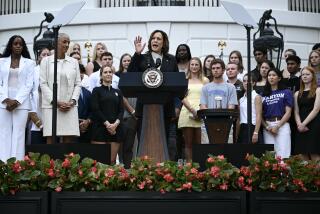Kamala Harris is prescribed antiviral drug after testing positive for coronavirus

Vice President Kamala Harris tests positive for the coronavirus but has no symptoms, and hasn’t had recent contact with President Biden, her office said.
WASHINGTON — Vice President Kamala Harris on Tuesday became the highest ranking official in the Biden administration to test positive for the coronavirus but was not experiencing symptoms, her office said.
The vice president was in California last week and has not had any recent contact with President Biden and most of the White House staff, her office said. She returned to Washington on Monday.
Harris “will isolate and continue to work from the Vice President’s residence,” Kirsten Allen, her spokesperson, said in a statement. “The Vice President will return to the White House when she tests negative.”
Harris had avoided catching the virus for months, despite close contacts having tested positive. Jamal Simmons, her communications director, announced a positive result earlier this month; Harris’ husband, Doug Emhoff, contracted the virus in March.
Doug Emhoff, husband of Vice President Kamala Harris, tests positive for COVID-19.
The vice president’s positive tests could create governing concerns given that Harris is first in the line of presidential succession to Biden, 79. House Speaker Nancy Pelosi (D-San Francisco), second in line, announced a positive test earlier this month.
Harris, 57, has been vaccinated and boosted twice. The shots greatly diminish the chances of her becoming seriously ill. When then-President Trump was hospitalized with COVID-19 in October 2020, he was at much higher risk, given his age — 74 at the time — and the lack of available vaccines. Trump has said he has since been vaccinated and boosted.
Allen tweeted Tuesday night that Harris had taken Paxlovid, a drug developed by Pfizer to treat people at high risk of becoming severely ill from the virus, including those over age 65 or with chronic conditions. Harris’ office pointed to guidance from the U.S. Centers for Disease Control and Prevention showing people over 50 are at higher risk for severe illness, though their risk remains lower than people in older age groups.
White House officials have said that they expect Biden will catch the virus, but the president has not been avoiding events with crowds. He is scheduled to attend the White House Correspondents Assn. dinner Saturday and to speak at a memorial service Sunday for former Vice President Walter Mondale in Minneapolis.
“Like many Americans, he makes risk assessments,” White House Press Secretary Jen Psaki told reporters.
Harris had initially planned to return to Washington from California, where she took some personal time and gave a speech about antisatellite missiles and another about maternal health, on Tuesday. Her office would not say why she altered her travel plans to return a day earlier but noted that she was not experiencing any symptoms before testing positive.
Because she had not been expected in Washington until Tuesday, Harris had a light schedule, with no meetings in the morning and no public events all day, said Allen, the spokeswoman.
Harris took a rapid antigen test Tuesday morning after going to work at the White House, Allen said. After that test came back positive, Allen said, Harris took a PCR test, a more accurate assessment that confirmed the rapid result. Harris left the White House for her residence at the U.S. Naval Observatory by motorcade.
Biden and Harris later spoke by phone. “He wanted to check in and make sure she has everything she needs as she quarantines at home,” the White House said in a statement.
Though Harris did not attend any formal meetings, the White House is still tracing her contacts to determine who may have been exposed to her. Even when they are not in formal meetings, vice presidents interact with an array of policy, communications and personal staff.
“Should we identify a close contact, we will notify them as appropriate,” Allen said.
Her office is also going through her schedule to see which public events and private meetings need to be canceled or shifted to a virtual setting.
Harris plans to work from her residence for at least five days and will not return to the White House until she receives a negative test.
The latest wave of COVID-19, sparked by the Omicron BA.2 subvariants, has swept through official Washington in recent weeks, infecting many members of Congress and the executive branch. The White House rhetoric has shifted from preventing infections to promoting vaccines, boosters and therapeutics.
“It is going to be hard to ensure that no one gets COVID in America,” Dr. Ashish Jha, the White House’s coronavirus coordinator, told reporters Tuesday. “That’s not even a policy. The goal of our policy should be obviously to minimize infections whenever possible, but to make sure people don’t get seriously ill. The best ways of doing that are make sure people are vaccinated and boosted as the vice president is and making sure we have plenty of therapeutics.”
Minutes after Harris announced her result, two Democratic members of the Senate — Ron Wyden of Oregon and Christopher S. Murphy of Connecticut — announced they too had contracted what they believed to be mild forms of the virus.
“It’s a bummer, but I’m sure if I wasn’t fully vaccinated I would be feeling a lot worse. So remember to get your booster!” Murphy tweeted.
Simmons, Harris’ communications director, tested positive for the virus after attending the April 2 Gridiron dinner, a traditional white-tie gathering of reporters and politicians in Washington that features light roasts and songs.
Atty. Gen. Merrick Garland and Gina Raimondo, the secretary of Commerce, announced positive test results after the dinner, as did Reps. Adam B. Schiff (D-Burbank) and Joaquin Castro (D-Texas).
All of them had been vaccinated, and none became seriously ill.
Harris’ positive tests come as the administration has tried to push the country toward normality, eliminating mask requirements in many settings and returning to public gatherings. A federal judge in Florida took it a step further last week, overturning a federal requirement to wear masks on airplanes, trains and buses. The administration is appealing that ruling.
“None of us can predict with any certainty where exactly this pandemic is going, what the virus is going to do next. All we can do is prepare,” Jha said, urging Congress to pass another round of funding to combat the virus.
Times staff writer Eli Stokols contributed to this report.
More to Read
Get the L.A. Times Politics newsletter
Deeply reported insights into legislation, politics and policy from Sacramento, Washington and beyond. In your inbox three times per week.
You may occasionally receive promotional content from the Los Angeles Times.












